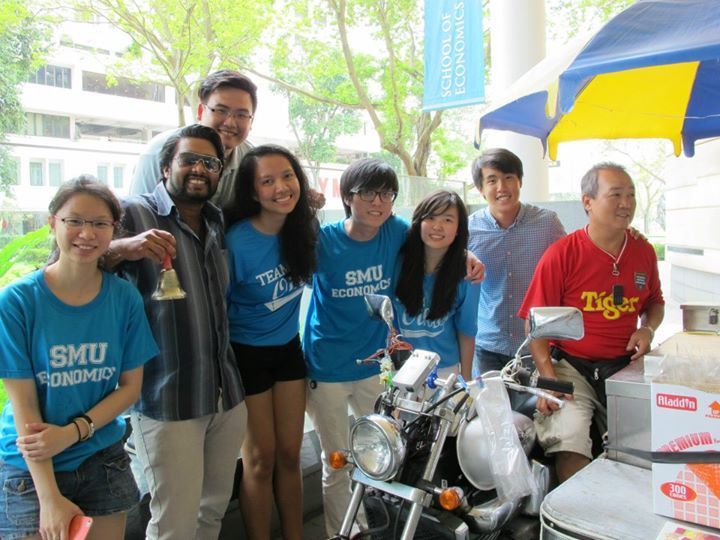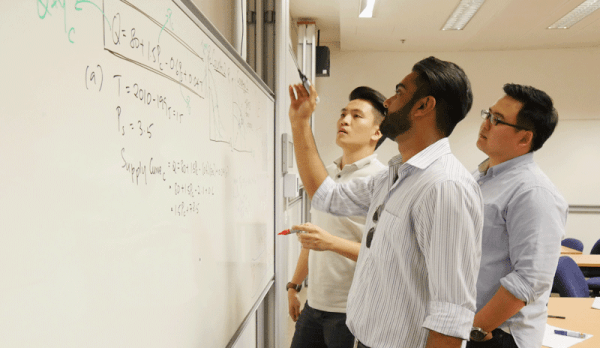
The study of economics is key to making sense of our world, and helps us to analyse, understand, and thereafter, tackle many of its problems. In this post, a current student fittingly shares his economic analysis of why the SMU School of Economics (SOE) is a great choice.
1. SOE moulds you like no other school can
Once you get over how challenging some of the courses are, you begin to appreciate how the mix of qualitative and quantitative approaches trains you to think. It really moulds your mind in a way that I don’t think I would have experienced in any other field of study. For instance, when I’m faced with difficult choices and complex decisions, they now automatically arrange themselves in a game theory payoff matrix in my head.

Gruelling though our field of study may be, going through this rigorous mental hardship together creates a very special kind of bond that’s shared by all Economics students in SMU. Literally any Economics student you meet can relate to the mind-bending challenge of trying to make sense of your first Econs lesson in Year 1 – be it MFE (Mathematics for Economics) or STAT 151 – where there is literally more Greek than English on the board, and to which your Professor refers as “high school revision”. It’s a bit like how guys are always talking about army, but in this case with more hot girls.
2. SOE provides you with fresh perspectives
The School of Economics curriculum will open your eyes to realities you may have never considered before. Intermediate Macroeconomics taught me why elected officials seldom keep their promises, and I learnt in Economics of Asymmetric Information that 17th and 18th century pirates organised themselves in a way which is almost identical to modern day democracy. On a sombre note, International Economics B brought me to the horrifying realisation that a cow in a US farm gets more subsidies than a starving Ethiopian.
3. You can choose from a wide range of second majors at SOE
The BSc. Economics programme gave me the freedom to take a wide range of modules outside the Economics curriculum, that count towards my degree. This is advantageous in two ways. Firstly, it gave me the versatility to plan my own curriculum according to my areas of interest.

Secondly, I was able to double-count some of my modules, which proved extremely convenient in fulfilling my second major requirements. And it’s not just me – I’ve found that my classmates were able to complete a second major in anything from Finance to Sociology by simply doing two extra modules.
4. You can specialise in economic tracks/ concentrations
The School of Economics allows students to concentrate in specific fields that they are interested in. The two main tracks offered by SOE are the Quantitative Economics Track (QET) and the Maritime Economics Concentration (MEC). The QET builds up quantitative skills, preparing students for technical careers in Research, Economics and Finance industries. It also provides good training for those who are keen to pursue graduate studies. The MEC on the other hand, prepares students for maritime-related roles in the private and public sector. Its students have access to industry scholarships and related learning opportunities, including site visits, study missions and internships organised by industry professionals.
While I didn’t take up either of these tracks, I have several batchmates in the MEC who have already secured attractive jobs in prestigious maritime firms well-ahead of graduation – one even with a full scholarship.
5. You will be highly employable when you graduate
Besides the above-mentioned intrinsic benefits, there are considerable extrinsic benefits that you can gain from your Bachelor of Science (Economics). As a budding economist living in pragmatic Singapore, you’ll be pleased to know that you can expect a decent return on your education investment via the employment market. BSc. Economics students from SMU have consistently fared rather well according to the Graduate Employment Survey.

As a counterpoint to the above, though, I find that the paradoxical beauty of studying Economics is that it instils in you the knowledge that money isn’t everything. All Economic concepts go back to the idea of trade-offs, and you soon realise that this is a parallel for life. As a rational actor, you know that you can never have it all; this forces you to think about what you value most, and what you are really willing to give up in the pursuit of material success.


